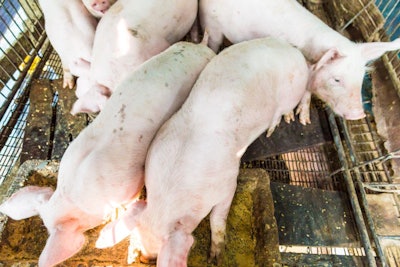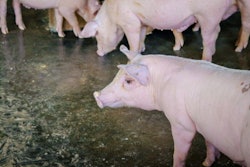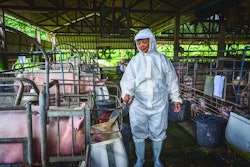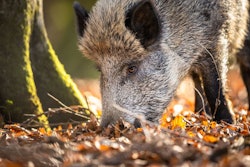
In the Philippines, Malaysia and Thailand, African swine fever is blamed for exacerbating disruption of pig meat supply chains.
With new cases officially confirmed at four locations during the second half of April, the number confirmed African swine fever (ASF) outbreaks in Thailand has risen to 86.
Latest notifications to the World Organisation for Animal Health (OIE) cover outbreaks involving 121 pigs. These belonged to three village herds in the south of the country, and one in the northeast.
Since the country’s first cases in November 2021, one or more outbreaks has occurred in 31 of the 76 provinces, and in all six of Thailand’s regions.
With some details of outbreaks unrecorded, the number of pigs involved in the nation’s ASF outbreaks likely exceed the 2,581 reported to the OIE.
As many as 80% of pig farmers in the northeast of Thailand suspended production as ASF spread in the region, according to the local producers’ association. At the start of May, Bangkok Post reported that this production drop — as much as 50% — has led to pork shortages in the country, and to rising prices of the meat. Urging farmers to return to production, the industry body called on the Thai government not to fill the supply gap with imported pork.
New ASF wave reported in Philippines
In the province of Cotabato, pig owners are suffering ASF losses in a second wave of the disease, reports Inquirer. It records the culling of more than 5,000 pigs in Kidapawan city and 10 other towns. Since the return of the infection in December 2021, ASF has impacted around 900 pig owners, leading to total losses of PHP26 million (US$496,000).
A local official blamed the resurgence of the disease partly on unregulated trading of pork from Davao City, and other potentially infected locations. Furthermore, owners of pigs with suspected infection in the Philippines are no longer compensated for their losses by the Department of Agriculture. Instead, owners are expected to register their herds in order to be covered by the Philippines Crop Insurance Corp. With many owners opting not to register, animals suspected with ASF infections are being sold through unregulated channels, according to the official.
Located in the Soccsksargan region, Cotabato is in the south of the island of Mindanao.
Meanwhile, in western Mindanao, new checkpoints have been set up around Zamboanga City, reports the Philippine News Agency (PNA). These latest controls have been put in place ahead of confirmation of positive ASF tests from three blood samples taken from sick pigs in the area. Although classical swine fever (CSF) and porcine reproductive and respiratory syndrome (PRRS) have not been ruled out, ASF is suspected as outbreaks have occurred recently in nearby Zamboanga Sibugay. This province belongs to the Zamboanga Peninsula region.
In one region on the island of Luzon, reports PNA, hog production was down 58% in 2021 compared with the previous year. Together with monsoon-related crop damage, ASF was blamed for a contraction in total agricultural output in the Cordillera Administrative Region last year.
More cases reported in Bhutan
Over the past month, the number of pigs directly involved in the ASF outbreak in southern Bhutan has risen to more than 1,000.
According to official notifications to the OIE since the end of April, a further 872 animals have been caught up in the outbreak. Three more swine have died, and 538 have been culled in order to reduce the spread of infection.
Since mid-April, all the cases have occurred in the village of Phurbaling. Located in the Chukha district, this village is close to the border with India’s West Bengal state.
Local official inspections reveal biosecurity measures to be good on the commercial farms in this area, according to OIE reports. However, sanitary standards are described as poor for semi-commercial and backyard herds. Based on this risk assessment, authorities have been carrying out targeted depopulation, disposal and disinfection procedures in the area.
Further ASF losses in northeast India
Over the past week, further ASF cases have been identified in the state of Meghalaya, reported India.com.
With 45 more deaths on one day alone, losses have now passed 250 in the Ri-Bhoi district of the state so far this year. First cases there were in mid-April.
In recent months, losses of pigs from ASF have been confirmed in other northeastern Indian states, including Tripura, Mizoram, Sikkim, and Assam.
ASF returns to two areas of eastern Russia
Aftera hiatus of almost 18 months, ASF virus has been detected again in Omsk, according to an official OIE notification.
Located in Russia’s Siberian federal district, the region had been free of reported cases since December 2020. This month, however, the disease was confirmed at a farm in the Omskiy district. Of the 330 pigs at the premises, 20 died. Fate of the remaining animals is not reported.
Meanwhile, in the Urals federal district, ASF has been detected after a four-month absence in the Khanty-Mansi Autonomous Okrug. Affected was a backyard herd of six pigs in the Oktyabrsky district. Just one of these animals died.
For the Far Eastern federal district, Russia’s veterinary authority has confirmed to the OIE that no new cases of ASF have been detected in swine or wild boar in the regions of Khabarovsk or Primorskiy.
Disease situation elsewhere in Asia
The number of ASF-infected wild boar in South Korea is approaching 2,600. According to the latest update from the United Nations’ Food and Agriculture Organization (FAO), the figure stood at 2,593 (as of May 11).
This is the figure reached since the country’s first cases were detected in September 2019. Since then, wild animals have tested positive for the ASF virus in four provinces. These include Gangwon and Gyeonggi and, since earlier this year, also North Gyeongsang and North Chungcheong. ASF has also been linked to outbreaks at 21 farms in South Korea, most recently in October 2021.
For the year to April 15, ASF has been detected in 14 communities in five regions in the Vietnamese province of Ha Tinh, according to FAO. This province is in the North Central Coast region of Vietnam.
In Eastern Malaysia, ASF has been blamed for the mortality so far of more than 3,200 backyard pigs and 5,500 commercial pigs in the state of Sabah. At the start of May, The Star also reported that around 200 wild pigs have also died of the disease.
Sabah’s agriculture ministry is urging all pig owners to report any suspected cases of the disease. ASF control is increasingly important, he said, as many farmers are ceasing production, unable to afford rising feed prices.
Meanwhile, in the neighboring state of Sarawak, Borneo Post reports official announcements that ASF is under control.
View our continuing coverage of the global African swine fever situation.
One further CSF outbreaks on Japanese farm
In the second week of May, one further outbreak of CSF was confirmed at a farm in Gunma prefecture. This is according to the latest notification from Japan’s veterinary authority to the OIE.
Previously, elevated mortality was observed at the premises in the Kiryu city area. Around 100 of the 5,500 pigs at the farm died. Remaining animals there have been culled.
As with Japan’s four previous CSF outbreaks since March, the cases were detected in the Kanto region. This forms the Greater Tokyo area on the largest island, Honshu. Affected have been farmed pigs in three prefectures — Tochigi, Ibaraki and Gunma.
Control measures have been completed at the previous outbreak, according to the OIE report. This occurred at Ota city in Gunma prefecture on April 21.
Latest cases bring to 13,600 the number of domestic swine in Japan directly impacted by CSF over the past six weeks.
Based on official notifications to the OIE, 81 CSF outbreaks have occurred in Japan since 2018, along with 4,183 infections in wild boar. Prior to September 2018, Japan had been free of CSF since 1982.
Like ASF, CSF (also known as hog cholera) is a notifiable disease that affects members of the pig family, according to the OIE. Both diseases can cause devastating losses in domestic and wild populations. However, they do not impact human health. Despite the similar names, CSF and ASF are caused by unrelated viruses.


















